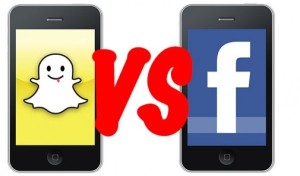Slingshot and Snapchat privacy issues
 Facebook has launched its new app Slingshot to compete with the highly popular Snapchat on iOS and Android devices. These instant image and video messaging platforms have become popular as users are able to send messages that ‘disappear’ once viewed, allowing for a quick and fun messaging service that appeals to the masses. However, Snapchat’s initial promise of private, one-time viewable image messages proved too good to be true. With this in mind, do users know what they’re signing up for with the recent (U.S. only) release of Facebook’s Slingshot?
Facebook has launched its new app Slingshot to compete with the highly popular Snapchat on iOS and Android devices. These instant image and video messaging platforms have become popular as users are able to send messages that ‘disappear’ once viewed, allowing for a quick and fun messaging service that appeals to the masses. However, Snapchat’s initial promise of private, one-time viewable image messages proved too good to be true. With this in mind, do users know what they’re signing up for with the recent (U.S. only) release of Facebook’s Slingshot?
It came to light earlier this year that Snapchat was involved in personal data collection. Their claims about privacy and security were certainly factors that assisted the app’s undying success, however, the company was reprimanded by the FTC (Federal Trade Commission) for false claims that messages ‘disappear forever’. What the company failed to explain to the ever-growing number of users was the very real possibility that someone could easily save a message using undetectable screenshots or one of the many third party Snapchat ‘add-on’ apps. The FTC’s complaint also claimed that the app could potentially track and send user location information and data from their contact list without consent. Snapchat did settle with the FTC’s claims eventually, acknowledging that communication with their user community about privacy and security could have been improved exponentially and redacting anything said about ‘disappearing’ image messages; after all, traces always remain once something is sent out into the internet, or in this case, sent out into Snapchat. As a result of this, the company is now subject to privacy monitoring for years to come. If the terms of the settlement are violated in any way, the company could face heavy financial penalties.
Slingshot vs Snapchat?
 Despite these fairly alarming circumstances, Snapchat, currently featured at #7 in the top free app list of Android’s Google Play Store and #10 in Apple’s App Store, remains extremely popular and has obviously paved the way for Facebook’s new Slingshot which was officially released for U.S. users a week ago. In November 2013, Facebook attempted to purchase Snapchat, but the US$3 billion offer was rejected.
Despite these fairly alarming circumstances, Snapchat, currently featured at #7 in the top free app list of Android’s Google Play Store and #10 in Apple’s App Store, remains extremely popular and has obviously paved the way for Facebook’s new Slingshot which was officially released for U.S. users a week ago. In November 2013, Facebook attempted to purchase Snapchat, but the US$3 billion offer was rejected.
Facebook has had it’s share of privacy and security problems in the past regarding personal information. Just as you can expect to receive friend requests from strangers on Facebook, you can expect to receive unwanted ‘slings’ on Slingshot as anyone can add you by username. Slingshot also claims itself as an app that sends ‘self-destructing’ picture and video messages. However, Slingshot does not feature a notification to the sender if their picture or video was screenshotted or saved by recipients in some way or another. Snapchat, which now instantly notifies the user when a screenshot is taken, has perhaps learned a valuable lesson in providing true privacy and security claims; a lesson that Slingshot will no doubt have to learn as well.
While the new app has only been available in the U.S. for a week, let’s hope that privacy marketing will be of a high standard and proper safety measures can be implemented before a world-wide release of Slingshot.


